
Mike Harding is a New Zealand folk musician born on 16 July 1952, [1] now living in New Plymouth, Taranaki. [2]

Mike Harding is a New Zealand folk musician born on 16 July 1952, [1] now living in New Plymouth, Taranaki. [2]
Growing up in Eketāhuna, Harding practised his music in "the streets, markets and clubs of Auckland in the early 1980s", before he describes himself as having spent a "Time on the Road" decade all over New Zealand and parts of Australia and Britain. [3] In 1998 he created his tenth recording, "Past to the Present", described by Radio New Zealand as a "20 track exploration of NZ from north to south, its people and places, past and present." [2] and his first record available on CD. In 2008, he followed it by "Here We Have a Land", with a selection of New Zealand folk songs and his own original creations. [3]
Mike Harding has played at the Auckland Folk Festival several times, especially in the 1990s, [4] was a top performer at the Marlborough Folk Society's concerts in Blenheim, [5] as well as playing at other music festivals like New Plymouth's "TSB Bank Festival of Lights". [6] Since about 1995, Mike Harding also plays on and off as guitarist of the Gumboot Tango band, appearing regularly at events like the Taranaki International Arts Festival. [7]
In 1992 he also wrote "When the Pakeha Sings of Home", a source guide to the folk and popular songs of European New Zealanders, described as important in raising the profile of a little-studied part of New Zealand popular music history. [8] [9]
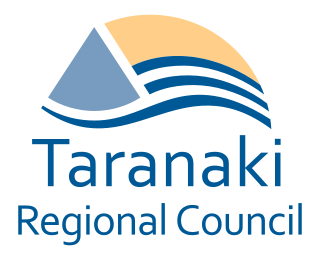
Taranaki is a region in the west of New Zealand's North Island. It is named after its main geographical feature, the stratovolcano Mount Taranaki, also known as Mount Egmont.
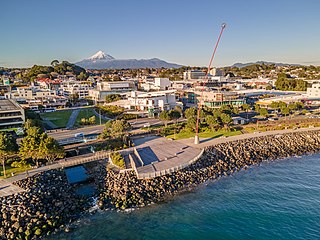
New Plymouth is the major city of the Taranaki region on the west coast of the North Island of New Zealand. It is named after the English city of Plymouth, in Devon, from where the first English settlers to New Plymouth migrated. The New Plymouth District, which includes New Plymouth City and several smaller towns, is the 10th largest district in New Zealand, and has a population of 88,900 – about two-thirds of the total population of the Taranaki Region and 1.7% of New Zealand's population. This includes New Plymouth City (59,600), Waitara (7,550), Inglewood (3,870), Ōakura (1,730), Ōkato (561) and Urenui (429).

The provinces of the Colony of New Zealand existed as a form of sub-national government. Initially established in 1846 when New Zealand was a Crown colony without responsible government, two provinces were first created. Each province had its own legislative council and governor. With the passing of the New Zealand Constitution Act 1852 the provinces were recreated around the six planned settlements or "colonies". By 1873 the number of provinces had increased to nine, but they had become less isolated from each other and demands for centralised government arose. In 1875 the New Zealand Parliament decided to abolish the provincial governments, and they came to an end in November 1876. They were superseded by counties, which were later replaced by territorial authorities.

The National Provincial Championship, often simply called the NPC, is an annual round-robin rugby union competition in men's domestic New Zealand rugby. First played during the 2006 season, it is the second highest level of competition in New Zealand alongside the Ranfurly Shield. It is organised by New Zealand Rugby (NZR) and since 2021, it has been known as the Bunnings NPC after its headline sponsor. A concurrent women's tournament is also held, the Farah Palmer Cup.
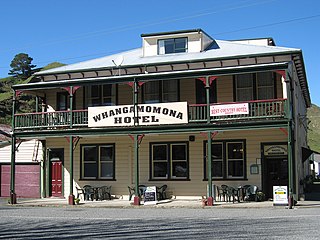
Whangamōmona is a small township in the Stratford District and Manawatū-Whanganui Region in New Zealand. It lies on State Highway 43, the "Forgotten World Highway", 65 kilometres (40 mi) north-east of Stratford and 55 kilometres (34 mi) south-west of Ōhura. By rail it is 61 kilometres (38 mi) from Stratford on the Stratford-Okahukura railway line.
TSB Bank Ltd trading as TSB, is a New Zealand bank with headquarters in New Plymouth. It has 25 branches across the country but is heavily focused on the Taranaki region where 12 of its branches are located. As of June 2022, it was the seventh largest bank in New Zealand, with a market share in terms of assets of 1.4%.

The Hits is a Hot adult contemporary music radio network, broadcasting to 26 markets across New Zealand. It was set up by Government broadcaster Radio New Zealand in 1993 by consolidating existing stations into a single brand and has been privately owned since 1996. The Hits has had the broadest broadcast reach of any radio network in the country since 1996, and is now available on 40 full-power FM frequencies and 18 iHeartRadio streams.
The following lists events that happened during 1905 in New Zealand.
The history of blues in New Zealand dates from the 1960s. The earliest blues influences on New Zealand musicians were indirect – not from the United States but from white British blues musicians: first the R&B styles of Fleetwood Mac, Eric Clapton, The Animals and The Rolling Stones, and later the blues-tinged rock of groups such as Led Zeppelin. The first American blues artist to make a big impact in New Zealand was Stevie Ray Vaughan in the early 1980s. Other blues-related genres such as soul and gospel almost completely by-passed New Zealand audiences, except for a handful of hits from cross-over artists such as Ray Charles.
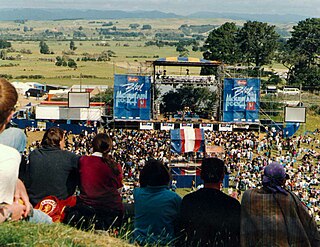
Music festivals have a long and chequered history in New Zealand. The first large outdoor rock music festivals were Redwood 70 in 1970 and the Great Ngaruawahia Music Festival in 1973. The largest was the 1979 Nambassa festival, one of several Nambassa festivals held around that time, in Golden Valley, just north of Waihi.
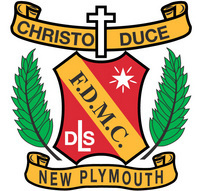
Francis Douglas Memorial College is an all-boys state-integrated Catholic school with boarding facilities located in Westown, New Plymouth, New Zealand. The college was founded in 1959 under the leadership of the De La Salle Brothers, a religious order of brothers based on the teachings of St. Jean-Baptiste de la Salle. It is one of two secondary schools established by the Brothers in New Zealand, the other being De La Salle College, Mangere East, Auckland. The name of the school is dedicated to the memory of Father Francis Vernon Douglas, a missionary priest who was killed while doing missionary work in the Philippines during the Second World War. The school educates approximately 760 boys, 130 of whom are boarders. The 60th Jubilee of Francis Douglas Memorial College was held on Queen's Birthday Weekend, 2019.

Ōakura is a small township in New Plymouth District, Taranaki, in the western North Island of New Zealand. It is located on State Highway 45, 15 kilometres south-west of New Plymouth. Ōkato is 12 km further south-west. The Oakura River flows past the town and into the North Taranaki Bight. To the south is the Kaitake Range, part of Egmont National Park.
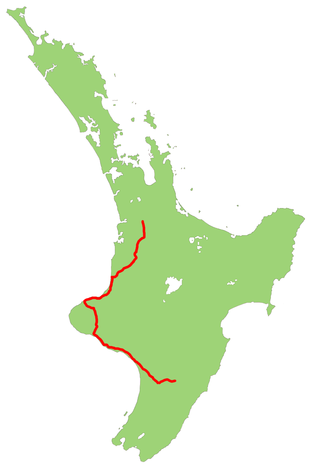
State Highway 3 (SH 3) is one of New Zealand's eight national state highways. It serves the west coast of the country's North Island and forms a link between State Highway 1 and State Highway 2. Distances are measured from north to south.
GTaranaki, also known as G-TARanaki, was New Zealand's first international guitar festival held in New Plymouth, Taranaki, New Zealand annually from July 2008. The week-long festival brings some of worlds best guitarists to Taranaki to perform, educate and inspire Kiwi guitarists and music fans around New Zealand. G-TARanaki features a celebration of all things guitar with guitarists and bands from a range of genres including Rock, Funk, Classical, Jazz, Blues and Metal.
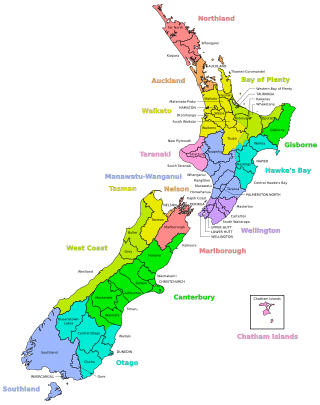
A district in New Zealand is a territorial authority area governed by a district council as a second-tier of local government in New Zealand, below regional councils. They were formed as a result of the local government reforms in 1989. There are 53 districts in New Zealand, and they do not include the 12 city councils, the Auckland Council, and the Chatham Islands Council. District councils serve a combination of rural and urban communities, while city councils administer the larger urban areas. Three districts are unitary authorities also performing the functions of a regional council.

The TSB Festival of Lights is an annual event held in Pukekura Park, New Plymouth. Running for free every year from mid-December to late January, it has a daytime and night time programme of events for people of all ages, with light installations illuminating the park. In 2021 the festival won the Best Local Government and NZ's Favourite Event Awards at the 2021 NZ Events Association Awards.
Katie Wolfe is an actor, film and stage director from New Zealand. She appeared in television series including Marlin Bay (1990s), Shortland Street, and Mercy Peak. Her screen directing work has won awards, including Redemption at the ImagineNative Film + Media Arts Festival and This Is Her at the Prague International Short Film Festival. Wolfe wrote and directed a stage play, The Haka Party Incident that was presented in 2023 in New Zealand.
The New Zealand Dance Company is an Auckland based, nationally focused contemporary dance company.

Rhana Jean Devenport is an Australian-born art curator and museum professional. She was director of the Auckland Art Gallery from 2013 to 2018, after which she became director of the Art Gallery of South Australia in Adelaide. She has announced that she will be moving to Sydney at the end of her contract on 7 July 2024.

Bell Block is a town in Taranaki, New Zealand. State Highway 3 runs through it. It is 6 km north-east of the centre of New Plymouth and 1 km from the outer edge of New Plymouth at Waiwhakaiho. Waitara is about 9 km to the north-east. New Plymouth Airport is located immediately to the north-east of Bell Block.